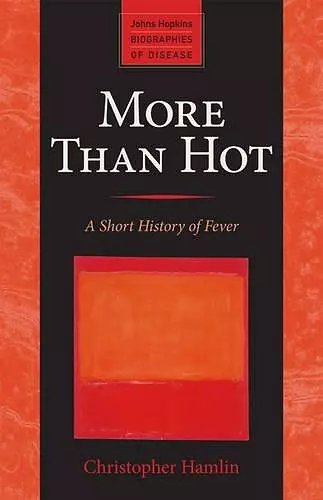More Than Hot
A Short History of Fever
Format:Paperback
Publisher:Johns Hopkins University Press
Published:24th Oct '14
Currently unavailable, and unfortunately no date known when it will be back

The technical history of fever concepts requires a knowledge of the history of complex changes in medical theory and practice over more than 2,000 years. To relate these matters to wider changes in Western society requires a historian not only of broad experience but one able to show how medicine was constitutive of those changes. In Christopher Hamlin, the subject has an author skilled in all these areas who brings to his topic a breadth of specialist and general knowledge, which makes this text a formidable contribution to various fields. More Than Hot is a dazzling, bravura book. -- Christopher Lawrence, University College London The author is a distinguished historian and an expert on the topic of fever, especially as it pertains to the modern period, public health, and Britain. -- Jacalyn Duffin, Queen's University
Broad in scope and sweep, Hamlin's study is a reflection of how the meanings of diseases continue to shift, affecting not only the identities we create but often our ability to survive.Christopher Hamlin's magisterial work engages a common experience-fever-in all its varieties and meanings. Reviewing the representations of that condition from ancient times to the present, More Than Hot is a history of the world through the lens of fever. The book deals with the expression of fever, with the efforts of medical scientists to classify it, and with fever's changing social, cultural, and political significance. Long before there were thermometers to measure it, people recognized fever as a dangerous, if transitory, state of being. It was the most familiar form of alienation from the normal self, a concern to communities and states as well as to patients, families, and healers. The earliest medical writers struggled for a conceptual vocabulary to explain fever. During the Enlightenment, the idea of fever became a means to acknowledge the biological experiences that united humans. A century later, in the age of imperialism, it would become a key element of conquest, both an important way of differentiating places and races, and of imposing global expectations of health. Ultimately the concept would split: "fevers" were dangerous and often exotic epidemic diseases, while "fever" remained a curious physiological state, certainly distressing but usually benign. By the end of the twentieth century, that divergence divided the world between a global South profoundly affected by fevers - chiefly malaria - and a North where fever, now merely a symptom, was so medically trivial as to be transformed into a familiar motif of popular culture. A senior historian of science and medicine, Hamlin shares stories from individuals - some eminent, many forgotten - who exemplify aspects of fever: reflections of the fevered, for whom fevers, and especially the vivid hallucinations of delirium, were sometimes transformative; of those who cared for them (nurses and, often, mothers); and of those who sought to explain deadly epidemic outbreaks. Significant also are the arguments of the reformers, for whom fever stood as a proxy for manifold forms of injustice. Broad in scope and sweep, Hamlin's study is a reflection of how the meanings of diseases continue to shift, affecting not only the identities we create but often also our ability to survive.
Hamlin expounds, with grace, wit and learning, the thinking of many of the major figures of medicine... Hamlin trawls medicine's history with great effect, uncovering a number of forgotten figures who had their own ideas about the causes, consequences and treatment of fever. -- W.F. Bynum Times Literary Supplement A senior historian of disease and public health, Hamlin displays considerable breadth and depth in his knowledge of medical theory and practice from different eras... What makes the book most impressive and compelling is Hamlin's ability to integrate the history of medicine and science with social and cultural history. PsycCRITIQUES
- Winner of CHOICE Outstanding Academic Title 2015 (United States)
ISBN: 9781421415024
Dimensions: 216mm x 140mm x 24mm
Weight: 476g
400 pages